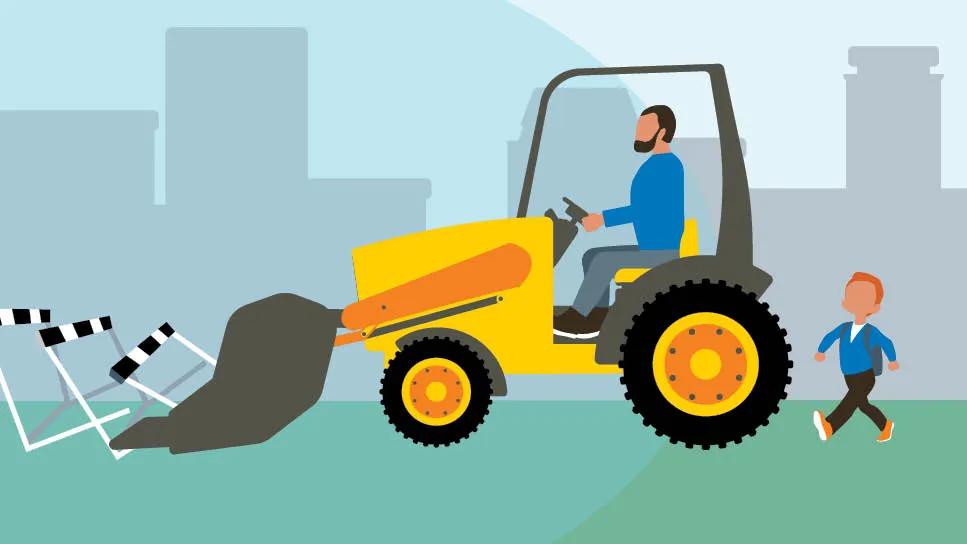By disrupting a child’s ability to think and act for themselves, snowplow parents run the risk of delaying their child’s ability to learn

Snowplow parenting (also known as lawnmower parenting or bulldozer parenting) tends to be rooted in good intentions. Like a snowplow clearing the road of ice and snow, parents clear the path for their children’s success by taking ownership of their children’s problem-solving abilities.
Advertisement
Cleveland Clinic is a non-profit academic medical center. Advertising on our site helps support our mission. We do not endorse non-Cleveland Clinic products or services. Policy
But when parents step in and clear the barriers, kids can be left out in the cold. They won’t learn from their mistakes or figure out how to solve conflicts on their own. Pediatric psychologist Vanessa Jensen, PsyD, ABPP, sheds light on why this is a problem and what you can do to avoid it.
While parents naturally aim to safeguard their children, snowplow parents take this a step further by bulldozing over every bump in the road to meticulously remove any obstacles that might challenge their child’s path to success. Snowplow parents set themselves apart from other parenting styles by being overly involved in their child’s decisions and fighting their battles for them. You might be a snowplow parent if you:
“Snowplow parents don’t want their children to have to truck through the snow and the muck, so they’re going to get all the dangers, all of the hurdles and all of the things that might be harmful out of the way,” explains Dr. Jensen.
Advertisement
Snowplow parenting often gets confused with helicopter parenting. Both are over-involved parenting styles that involve some hovering over the children. But helicopter parents usually hold back from controlling the situation until an emergency calls for intervention. Snowplow parents tend to charge in from the get-go, creating a power dynamic that puts the parent’s anxiety about their child’s success above the importance for the child to learn those skills for themselves.
“The drive of these patterns of parenting are similar, but snowplow parents work keep their child from having any frustrations or failures, even if that means doing things for their child,” says Dr. Jensen. “With helicopter parenting, there are still aspects of micromanaging at play. They still expect their child to do their homework, but they’re going to make sure they are constantly aware of the deadline and what needs to be done.”
While snowplow parenting may sound like a good idea at first, this parenting style can actually cause more problems for kids now and in the future.
“Think about it: Playing in the snow could be fun, but you also learn a lot by doing it,” Dr. Jensen illustrates. “You don’t go in the snow in your bare feet. You don’t climb in the snow when there’s ice underneath it.”
By snowplowing your child’s path to success, you can actually disrupt their ability to develop real-world skills.
“There are things you learn when you’re climbing through challenges,” she continues. “The basic downside of making everything wonderful for your child is that it’s harder for them to learn how to maneuver around those hurdles on their own or sometimes even to be aware of the dangers.”
Other negative outcomes that could result from snowplow parenting include:
“One common thing we see with snowplow parenting is that when the parents do too much, kids begin to expect that they should be able to do everything at the level of their parents,” says Dr. Jensen. “In reality, it’s important that they do the work and learn from their experiences because it’s not going to ever be perfect.”
There are solutions you can rely on to make sure snowplow parenting doesn’t drag you down a dark and stormy path. Dr. Jensen recommends the following strategies for parents who want to turn the plow around:
Advertisement
Advertisement
“A lot of parents fall into these behaviors because they think a parent’s job is to make their child happy,” shares Dr. Jensen. “But I always say that our job as parents is to help them become healthy, happy, functioning adults, which sometimes means they’re not always going to be a happy kid. Sometimes, they’re not going to like you when they have to clean their room or do their homework. But they will survive.”
Advertisement

Sign up for our Health Essentials emails for expert guidance on nutrition, fitness, sleep, skin care and more.
Learn more about our editorial process.
Advertisement

Most kids start losing baby teeth around age 6 — but there’s some wiggle room in the timeline

From playful movement to strength-building, kids need exercise to stay healthy and strong

Combat summer learning loss and keep young brains engaged with low-pressure learning

Heap on the praise for a job well done and stay consistent

Have their eyes evaluated shortly after birth, before their first birthday, and at ages 3, 5 and beyond

Routine screenings at school are normal and important

Teaching kids how to share at the appropriate age can help them develop social skills and manage their emotions

Creating a pal in their mind can help children learn social skills, overcome fears and build creativity

Even small moments of time outdoors can help reduce stress, boost mood and restore a sense of calm

A correct prescription helps your eyes see clearly — but as natural changes occur, you may need stronger or different eyeglasses

Both are medical emergencies, but they are very distinct events with different causes